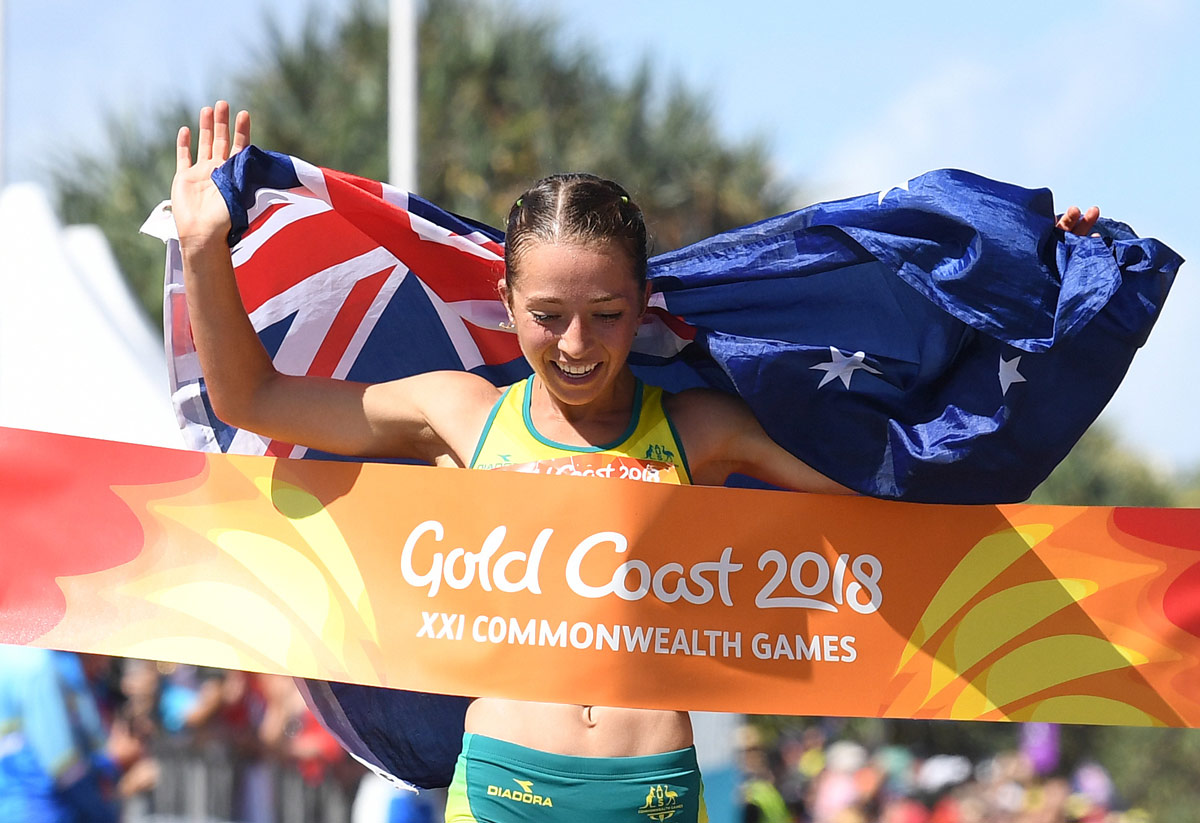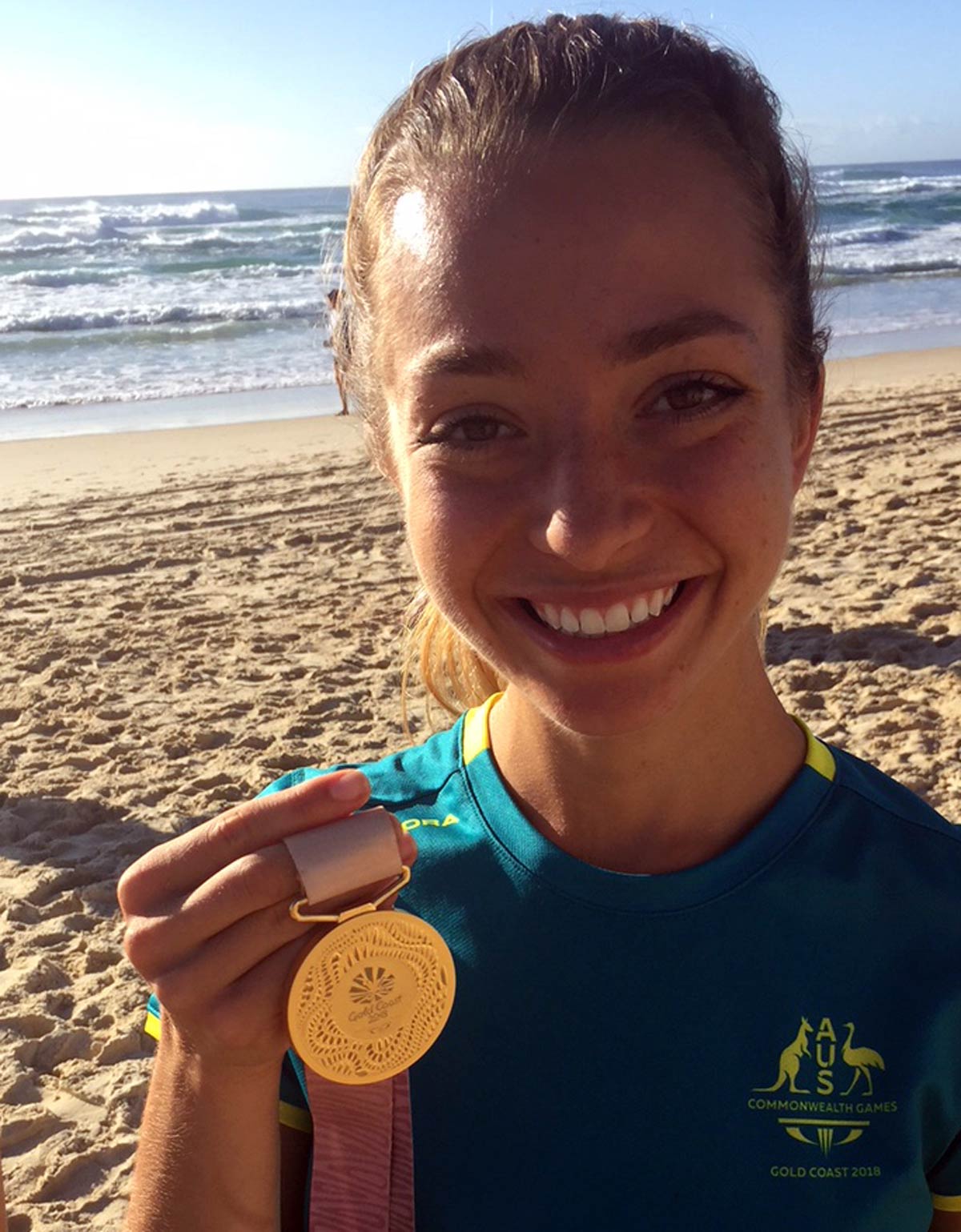
For elite athlete, Jemima Montag (OW2016), the road to the Olympics has always been long, and with the Tokyo Olympic Games now postponed as a result of COVID-19 containment measures across the globe, that road just got longer. Here, she explains three lessons she’s learnt on that road about creating a support network, seeking feedback and embracing challenges.
I was in purple and gold right through my schooling, starting from Prep. Wesley was where I learned to tie my shoelaces and lost my first tooth. It was my Prep teacher who supported me in the three-week stop-sucking-your-thumb journey. It was when we walked between classes in two neat lines that I met my best friend, Will. It was where I had a new opportunity to pick up a musical instrument in Years 2, 5 and 7; where we experienced a new sport in PE every few weeks; where we learned to debate from Year 5, which led me down a path of public speaking.
It was where I learned at Clunes what cooperation means when you’re living with peers 24/7 – an incredibly useful skill when I’m on long training camps – and where, at Yiramalay, I strengthened my connection to Indigenous Australians, something I’ve continued to do through the athlete community engagement initiatives, Raise the Bar Academy and Share a Yarn. It was where I had the opportunity to be a leader during Year 12, where I learned what it takes to achieve at a high level.
So what have I learned about achieving at a high level since I graduated from Wesley in 2016? Plenty, but three of the most important lessons are about creating a support network; being curious and open to feedback; and embracing challenges.
Create a support network
At the end of Year 12, my family was travelling through Japan. I’d taken a step back from competitive sport to channel my energy into the International Baccalaureate Diploma Program and embrace all the opportunities Wesley offered. During this time away from my sport, though, I also lost touch with my ‘why’ factor, and self-doubt and social fomo got the better of me, but it was in Japan that my younger sister urged me to go to the 2020 Tokyo Olympics – she thought Japan was pretty great and, being a bit of a stationery and sushi addict, she wanted an excuse to return.
The thought of transitioning to senior racing and all it would take to compete for Australia at the Olympics overwhelmed me, because I had this belief that I had to do everything on my own: leaning on others wasn’t a skill I had developed. My mum, who seems to have this skill of overhearing when her input is needed, said she thought I definitely had what it takes to make the Olympics. She reassured me that my family would be there supporting me each day and there would be no pressure from them.
Simply by showing me that I had a small support network of four family members made that initial self-doubt fade. You see, I’m a big over-thinking perfectionist who once thought I needed to have complete control. In 2016, as Charities Prefect, my initial one-woman-show approach wasn’t fun for anyone. It left me exhausted and meant I wasn’t harnessing the breadth of expertise, knowledge and skill that the rest of my committee could offer. What I learned about great leadership from this was that we can lead alongside others. Everyone has a unique gift to offer, and if you’re able to develop the self-awareness to know where your strengths and weaknesses lie, and recognise the gift that others bring and lean on them, you can elevate your outcome and empower others.
I transferred what I learned to my sport, and now each challenge I face is a matter of trusting the team. At the 2019 World Track and Field Championships in Qatar, in 40 degree heat and a race at midnight – the thought of which could have been enough to make my head explode just hours before the race – I knew our preparation had been watertight. I had delegated so that my coach was in complete control of the training program; there were dieticians, psychologists, physios and more ensuring that my engine could function in the extreme heat and humidity; my family and friends could offer support in other ways, such as by sending warm messages of good luck. In the end, we crossed the line 10th in the world.
What if… be curious and open to feedback
I’ve also learnt that it’s important to be curious and open to feedback. Like many people, my inquisitive inner child who constantly wondered what if… seemed to have been replaced over the years by a teenager who thought she had all the answers and then a young adult who realised how little she really knew. Regaining that sense of curiosity has allowed me to develop my skills, figure things out and connect with people. Channelling my curiosity and being open to feedback has enabled me to excel in my chosen area.
In an effort to become the best athlete I can be, I try to approach each task with a sense of wonder. This attitude has helped me when my coach wants me to melt inside a heat chamber during training. I’ve made it my business to understand the physiological adaptations that are necessary if I’m to compete in the heat, such as a higher sweat rate and increased plasma volume, and which muscles each exercise in the gym is targeting and how that relates to my racewalking technique, and my sports dietician recommends certain foods to replenish my energy levels and avoid injury.
Curiosity enables me to continue improving, but feedback was something I used to really dislike. I hadn’t developed the maturity to be okay with imperfection, so it felt offensive. But feedback is like compound interest to your talent bank account. Everyone you interact with on a daily basis – your peers, teachers, a neighbour – can help you excel in your craft. Being open to feedback encourages you to ask more questions: what’s going well, what should we work on? And that makes you more ‘magnetic’.
We can all become more magnetic: by asking more questions and really listening and taking on feedback, we not only lift our potential for excellence, but also empower those around us to unlock their own.
Embracing challenges
So we’re all set to climb our own mountain: we’ve created a support network to get us to the base of the climb with snacks, a headtorch and a map; all our curiosity and receptiveness to feedback means we’re ready; and we have a clear and challenging goal. We’re ready for the ascent, but there’s one final thing we need to know: how to acknowledge and handle the challenges and victories, the dark moments and the vibrant ones.
Something I’ve learnt from sport is that the big successes and feelings of accomplishment don’t come around very often. When a spectator sees you cross the finish line or stand on the podium, they only really see the minutest fraction of a very long journey.
For a time I found myself caught in a cycle where I’d set a new goal for a race coming up and, until that was ticked off, everything that I was doing was just something I was enduring to reach that goal. But what if I didn’t reach that goal? What if an injury came along or, having travelled halfway across the world, I was disqualified two kilometres before the finish line? Equally, what if I did reach that goal, but didn’t taken the time to be grateful and enjoy the process? Would all the sacrifices – to my relationships, health and happiness, and all the rest – be worth it?
While it feels fantastic to place a big tick beside a goal, and goals are important as they can guide us towards purposeful, fulfilling journeys, I’ve learned that a goal isn’t so much a destination as a direction.

‘While it feels fantastic to place a big tick beside a goal, I’ve learned that a goal isn’t so much a destination as a direction’
With that in mind, I’ve found comfort in the idea that climbing my mountain will require early morning alarms, injuries and mental toughness, but it will also bring new friendships, bursts of endorphins, opportunities to travel and be a role model for young people, and I’m grateful for the challenges and the gifts of sport because together, they bring out the best version of me.
Every school year delivers many rewards, from the development of greater knowledge and skills to incredible cocurricular experiences to closer friendships, but it will inevitably also come with its challenges, from balancing study with big band, committee meetings and netball, say, to feeling overwhelmed by the perceived expectations.
We all have a choice – to be fixated on the final destination or to embrace the process and all it will bring. I’ve found the latter to be far more rewarding. It enables us to take all the little steps we need to take and celebrate the small wins along the way, and even helps us to extend our gratitude to our support network as we reflect on each step. It enables us to see that if we get lost along the way up our mountain or lose our footing, we can look back and see how far we’ve come, and even appreciate the view, before reaching out to a mentor for feedback. It enables us to see our failures as opportunities for personal growth, celebrating them just as we do our successes.
The Japanese have a beautiful word, kintsugi – ‘golden repair’ or ‘precious scars ‘ – which suggests that our imperfections should be celebrated as they make us unique. For us, if we break a plate at home, we dispose of it; for the Japanese, this is an opportunity to mend the broken pieces with a gold-leaf glue. They see mending as a positive opportunity to create beauty where we see only imperfection and uselessness.
I’ve learned that to master your craft and draw people to you with your magnetism – as a student, a leader, an athlete, whatever you may be – you need to create a support network, be curious and open to feedback, and embrace the challenges of your goal so you can enjoy the journey, one step at a time. This is the learning that will have helped me if and when I finally toe the line for the 20 kilometres walk at the Olympic Games in Tokyo. I’ll even have tied my shoelaces the way I learned back in Prep at Wesley.
Jemima Montag (OW2016) was the gold medallist in the 20 kilometres walk at the 2018 Commonwealth Games. She was the Under 20 gold medallist at the 2014 Oceania Race Walking Championships and won a bronze team medal, with Clara Smith and Elizabeth Hosking, in the 10 kilometres walk at the 2014 IAAF World Race Walking Cup. She placed 10th in the 20 kilometres walk at the 2019 World Championships in Doha, Qatar. She won the 2020 Oceania and Australian 20 kilometres walk at the Race Walking Championships in Adelaide in February, earning automatic qualification for the 20 kilometres walk at the 2020 Olympic Games in Tokyo scheduled for July. She is completing a Bachelor of Science with an immunology major at the University of Melbourne.
This is an edited version of her address to the Senior School student leaders at the St Kilda Road Campus in February.